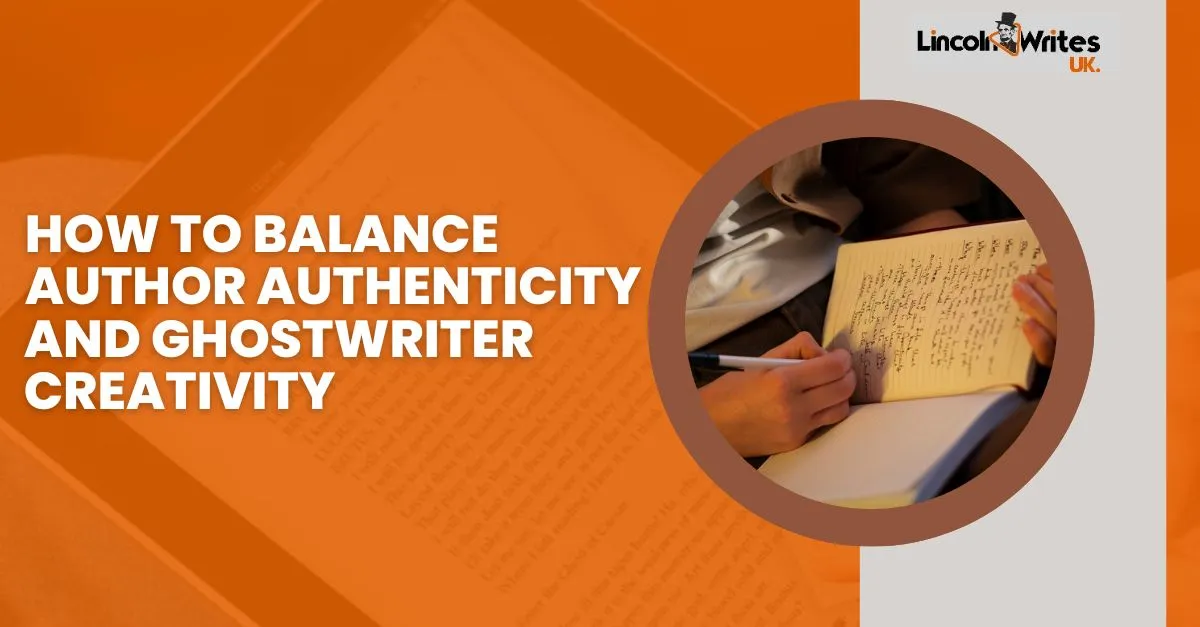When it comes to writing, it’s not everyone’s cup of tea. Sure, some know their way around words, but that’s not the case for everyone. For that, business leaders and influencers are partnering with ghostwriters to do just that.
Ghostwriting is no longer the industry secret it once was. These days, it’s a smart strategy. From business leaders and influencers to novelists and public speakers, people are working with ghostwriters more than ever to bring their stories, expertise, and big ideas to life.
But when you’re letting someone else write in your voice, a crucial question arises: how do you maintain authenticity in ghostwriting while still allowing room for the ghostwriter’s creativity?
Because let’s be clear, this isn’t about faking it. A strong ghostwriting relationship should result in work that’s unmistakably you… just more polished, structured, and ready for the world. And great ghostwriters know exactly how to pull that off.
In this post, we’ll unpack how to strike the perfect balance between authenticity and artistry, with practical tips for working with ghostwriting services, setting clear expectations, and reviewing drafts like a pro.
Why Authenticity Matters in Ghostwriting
Whether you’re writing a memoir, business book, or novel, your voice is your brand. Readers are not just around for a good story. They want your story, in your words. That’s what builds connection, trust, and credibility.
If your book sounds like someone else wrote it (because someone else did), readers will sense the disconnect. This is especially true in nonfiction, where vulnerability and authority are everything.
Maintaining authenticity in ghostwriting ensures your personality, beliefs, and voice shine through, even when someone else is doing the typing. You can say there’s a thin line between authenticity and faking it.
How Ghostwriters Tredges Along this Thin Line?
Now, let’s not forget: you hired a ghostwriter for a reason.
Whether you’re pressed for time, struggling with structure, or simply not confident in your writing skills, a ghostwriter brings clarity, rhythm, and flow to your message. This is where their creativity shows up, not in replacing your voice, but in shaping it into something compelling and publishable.
A skilled ghostwriter knows how to:
- Find your tone and mimic it accurately
- Fill in narrative gaps with creative (but on-brand) transitions
- Organise content for pacing and reader engagement
- Offer storytelling techniques without compromising your intent
This balance is what makes collaborative writing vs ghostwriting such an important conversation. Collaboration implies you’re still hands-on. Ghostwriting can be completely hands-off, but with the right process, it never feels detached.
Communication-The Foundation of Authentic Ghostwriting
A ghostwriter can only be as authentic as the input they receive. That means hiring a ghost writer is not a one and done deal. Thorough support and communication is always necessary to ensure that ‘you’ shows when they write any content for you. And for that you need clear, open, and frequent communication as a part of your professional relationship with your ghostwriting partner. Here are a few ways to do so:
Set Expectations Early
Start with a discovery call or questionnaire. Talk about:
- Your goals for the book
- Your target audience
- Your tone (formal? friendly? humorous?)
- Any must-include stories or phrases
- Any “don’ts” (e.g. tone or topics you want to avoid)
If you’re planning a ghostwritten series planning strategy (for business books, children’s stories, or online guides), ensure you discuss long-term vision from day one.
Share Voice Samples
If you’ve written blog posts, newsletters, or spoken on podcasts, share them. These give ghostwriters insight into your natural phrasing, humour, and rhythm. Voice memos work too.
It’s a bit like technical ghostwriting. The more specific input the writer receives, the better they can mirror the original voice, even in complex or niche subjects.
Trust the Drafting Process (But Stay Involved)
1. First Drafts Are Conversations
A ghostwriter’s first draft isn’t final. It’s a starting point. Use comments and tracked changes to steer the tone closer to your own. Be honest, but not rigid. Aim to shape rather than micromanage.
2. Ask for Voice Check-Ins
Before writing full chapters, ask for a voice sample or an intro paragraph. This lets you approve tone early and avoid extensive rewrites later.
3. Use Recorded Interviews
If writing isn’t your thing, just talk. Many children’s book ghostwriter clients prefer to voice-record their stories or ideas, which the writer then adapts into child-friendly language and pacing.
4. Don’t Edit Out the Personality
Sometimes, in an effort to sound “professional,” authors accidentally strip all the warmth and personality from their own story. Don’t let that happen.
Authenticity doesn’t mean stiff formality. It means sounding like yourself. Your quirks, your phrasing, even your contradictions make you relatable. If your ghostwriter captures that, celebrate it. Don’t polish it away.
Need help reviewing drafts without losing voice? Our team includes editors who specialise in tone preservation, especially crucial in memoir and biography projects where personal truth is everything.
Proofreading- Keep It Clean, Keep It You
Once the writing is done, it’s time to polish, but carefully.
This is where the importance of proofreading comes in. While your editor or proofreader should correct typos and grammar, they shouldn’t touch your voice. That balance is critical in ghostwritten work.
When proofreading, consider:
- Human vs AI proofreading: AI can catch errors, but it often “corrects” your personality right out of the page.
- Proofreading ebooks vs print: Each format requires different attention to layout and metadata.
- Choose the right proofreader: Ideally, someone experienced in working with ghostwritten or voice-sensitive texts.
And for authors planning to publish digitally, be sure to prepare your manuscript for ebook formatting to avoid layout issues that can disrupt your storytelling flow. That we can also help with if you’re up for it.
Real-World Application: Where This Shows Up
Maintaining voice and creativity is essential across genres:
- Business books: A ghostwriter may shape your expertise into engaging chapters, but your confidence, tone, and beliefs must still shine. It affects how readers apply your advice and whether they hire you after reading.
- Children’s books: Writers need to speak both to and for the child. Your intent as the author should guide the narrative, even if you’re not writing every line. In these projects, your brand, mission, and values matter just as much as rhyme or colour.
- Memoirs: Perhaps the most personal of all, this is where authenticity can’t be faked. If the tone feels “off,” the reader won’t trust the story, even if the facts are technically accurate.
And yes, even the logistics matter. From ebook metadata optimisation to choosing from the top ebook publishers UK, everything from your book’s description to its pitch must reflect your true voice.
Avoiding Pitfalls- What to Watch For
- Overwriting: If your ghostwriter uses overly complex or flashy language that doesn’t feel like you, say so early.
- Under communication: Going silent between drafts is a quick way to drift off-brand.
- Editing to Death: After too many hands have been involved, the voice starts to disappear. Keep your circle small and aligned.
- Rushing the review: Even with help, you need time to assess whether the draft feels like yours. Don’t rush this stage.
And always read the fine print, especially when it comes to ownership rights. A solid ghostwriting contract protects your vision, your voice, and your intellectual property.
Final Note
Balancing authenticity in ghostwriting with a ghostwriter’s creative strengths isn’t just possible. It’s the secret to powerful, publishable writing. When done well, your audience should never ask, “Did someone else write this?” Instead, they should say, “This is so you.”
At Lincoln Writes UK, we don’t just write, we listen. Our ghostwriting services are built to preserve your voice, elevate your message, and bring your ideas to life with honesty and heart. Whether you’re writing your first book or planning a ghostwritten series, we’re here to guide the process, draft by draft.
Need help defining your voice before you start writing? Let us know, we can create a tone-of-voice guide just for you. Or ask for our ghostwriting questionnaire to get started on the right foot.


